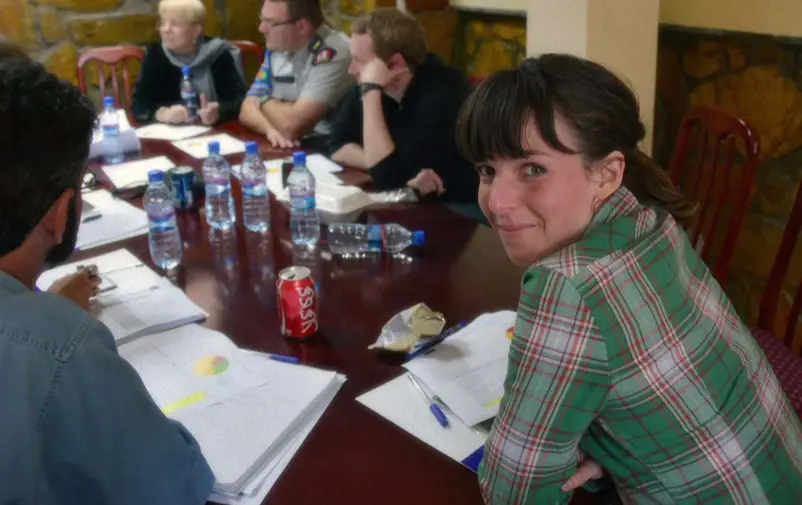
The 1325 Scholarship was established in memory of gender equality expert and peacebuilder Zaida Catalán.
Why did you apply to the course on security sector reform?
– In my daily work in Colombia, I come across many issues related to the topic and thus became interested in security sector reform. I found the course to be a great opportunity to learn more about the complexity of SSR and to exchange knowledge, opinions and experiences with an international group of professionals working directly or indirectly in fields related to SSR.
How is your work connected to SSR?
– The mandate of the mission I work for implies monitoring the implementation of transitional justice in Colombia, that is justice measures that aim at overcoming impunity and providing accountability. Part of this work includes observing steps carried out by state agencies to guarantee access to justice, psycho-social rehabilitation and the reintegration of demobilized combatants.
– An important aspect we often come across in our work is related to the challenge of building trust between the population and the police, and between the population and the military. The context of Colombia is complex due to a conflict that has lasted for decades, and in which different actors, including those of the state, have played a role. A mutual understanding of the problems is needed, and, amongst others, we contribute to improve and enhance communication between different state institutions and between state institutions and civil society.
– An example of our work, carried out with my colleague in Medellín and the Colombian agency for reintegration (ACR) and other relevant institutions, is a project where demobilized women were supported to become ‘peace builders’ and carry out projects benefitting their communities to contribute to reconciliation and peaceful societies.
“We need to listen to the people who have been affected by the conflict”
What have you learned during this course?
– The course was very useful in highlighting the importance of paying more attention to the challenges of a reform process in a fragile context, where the roles of different actors of the security sector might change as a result of a potential peace agreement. I really appreciated Maureen Brown’s lecture in which she highlighted that we need to listen to the people who have been affected by the conflict and get to know their needs, instead of applying preconceived and fixed ideas from the outside or from ‘above’. Another interesting and very useful part of the course was the application of different tools, like the actors mapping, to analyze the context and the roles and relationships between different groups or people. Identifying risks, talking to different actors and bringing them together was emphasized in the course, and this is also of great importance in the ongoing Colombian peace process.
In light of the ongoing peace process, which reforms do you think will be needed in Colombia?
– After decades of conflict in Colombia, it will be a challenge to change mindsets and attitudes, not only of those actors working on or with the security sector. Fears connected to a potential restructuring of the security sector can arise when people have to adjust to new roles or tasks. It is important to listen to the concerns both of the military and police but also of civil society. It is highly relevant to ensure room for dialogue to exchange viewpoints, allow for reflection and learning and understand the different roles and mandates in the process.
What is the next step for your organization in Colombia?
– While we continue the monitoring of existing transitional justice measures and security conditions, we will continue focusing on the conditions for peacebuilding in the different regions, urban and rural, of Colombia. This includes successful processes for reconciliation, potential risks related to the presence of criminal groups, economy related conflicts and challenges with respect to a new demobilization process. In that regard, we are also in continuous dialogue with state institutions and the security sector to provide recommendations based on our monitoring and analysis.
MORE FROM HOME
Are you a young peacebuilder at the beginning of your career with a strong commitment to women, peace and security? Do you have experience working in this field in the Democratic Republic of Congo or Afghanistan and want to take your commitment to the next level? Then you have the opportunity to apply for the 1325 scholarship for 2026.
2025-11-06 15:30FBA has both increased and adapted its work in Ukraine in the wake of Russia's invasion.
FBA in UkraineKlara Grenhagen works as a specialist at FBA's Africa unit with a focus on dialogue, reconciliation and peace processes.
More about our expertsFBA is part of Sweden’s development aid within the area of peace and security
Read more about the countries where we work